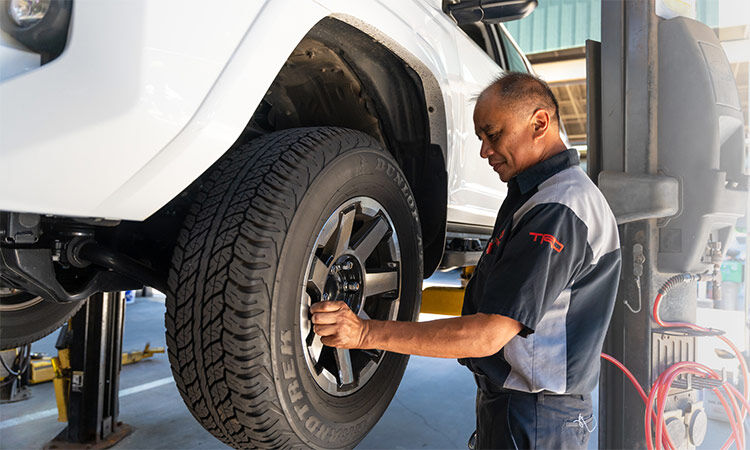The Link In Between Tire Solution and Fuel Effectiveness
Amongst the various elements that influence gas effectiveness, tire solution stands out as a critical element that frequently goes ignored. The detailed relationship between tire maintenance and fuel economic climate is a testament to the complex operations of a vehicle.
Importance of Correct Tire Rising Cost Of Living
Appropriate tire inflation is an important factor in making best use of fuel performance and making certain optimum vehicle performance. On the various other hand, overinflated tires can lead to a harsher experience, uneven tire wear, and decreased traction - morris tire.
Keeping the appropriate tire stress not just improves gas efficiency but also boosts driving security. Frequently inspecting and changing tire pressure, especially previously lengthy journeys, is a basic yet efficient way to optimize your automobile's fuel economic climate and guarantee a smooth driving experience.
Impact of Tire Tread Deepness
Preserving the suggested tire pressure is important for optimum car efficiency and gas performance; likewise, the walk depth of your tires plays an important duty in making certain safety and grip when driving. Tire walk deepness straight affects the ability of your tires to grasp the roadway surface, particularly in damp or unsafe conditions. As tires wear down, their walk depth declines, influencing their capacity to network water away and preserve proper call with the roadway. The recommended minimum step depth is typically 2/32 of an inch, however, for improved security and performance, numerous experts suggest altering tires prior to they reach this factor. Correct walk depth not just makes sure much better handling and braking however also contributes to fuel effectiveness by minimizing moving resistance. Consistently inspecting your tire walk depth and changing tires when necessary is a simple yet effective way to promote both safety and fuel performance when traveling.
Duty of Wheel Placement in Efficiency
Ensuring exact wheel positioning is crucial for optimizing automobile efficiency and maximizing fuel economic situation. Appropriate wheel positioning entails adjusting the angles of the wheels to supplier specs, ensuring that they are alongside each other and perpendicular to the ground. When wheels are misaligned, it can lead to unequal tire wear, boosted rolling resistance, and decreased gas efficiency.

Furthermore, accurate wheel positioning can also improve handling and stability, reducing the quantity of power needed to steer the vehicle (morris tire). By reducing unnecessary rubbing and drag, appropriate wheel alignment plays a crucial role in enhancing general lorry effectiveness and fuel economic climate. Routine wheel alignment checks and changes are crucial for maintaining ideal performance and optimizing gas savings
Link Between Tire Maintenance and MPG
An essential aspect of optimizing gas performance in vehicles is the upkeep of tires and their straight influence on miles per gallon (MPG) Proper tire upkeep plays an important duty in maximizing gas economic situation. One essential aspect impacting MPG is tire stress. Underinflated tires raise rolling resistance, causing the engine to work more challenging and shed even more fuel. On the other hand, overinflated tires decrease the get in touch with spot with the roadway, resulting in unequal wear and lowered fuel performance. Consistently checking and maintaining the appropriate tire pressure can considerably improve best site MPG.
In addition, tire walk depth likewise influences fuel efficiency. Worn-out footsteps minimize traction, specifically in wet problems, requiring the engine to exert even more power to preserve rate. This boosted resistance outcomes in important source greater fuel consumption. By ensuring tires have ample tread deepness, chauffeurs can enhance both security and fuel economic situation.
Essentially, correct tire upkeep, including monitoring tire stress and tread deepness, is directly linked to accomplishing optimum MPG. By integrating routine tire evaluations and upkeep into a car care routine, chauffeurs can not only expand tire life but additionally improve fuel efficiency, ultimately conserving money and decreasing ecological influence.

Tips for Fuel-Efficient Tire Treatment
Provided the critical partnership in between tire maintenance and gas performance, implementing efficient approaches for maximizing tire care is essential to improving general lorry efficiency. Revolving tires at recommended intervals advertises even step wear, boosting gas effectiveness by making sure all tires add equally to car efficiency. By integrating these fuel-efficient tire care pointers right into a routine upkeep routine, drivers can take full advantage of gas effectiveness, reduce operating expenses, and prolong the life of their tires.
Conclusion
In final thought, appropriate tire service plays an essential duty in gas efficiency. Preserving proper tire rising cost of living, monitoring tread deepness, and making certain wheel positioning can all add to making the most of miles per gallon. By consistently preserving tires and adhering to fuel-efficient tire care ideas, chauffeurs can optimize their car's performance and lower gas intake. It is important to focus on tire maintenance to not just conserve money on gas expenses however likewise to promote overall vehicle effectiveness.